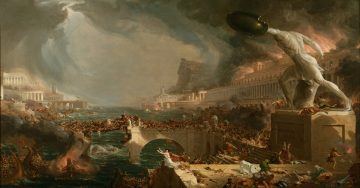Lewis Lapham in Lapham’s Quarterly:
 The warming of the planet currently spread across seven continents, four oceans, and twenty-four time zones is the product of a fossil-fueled capitalist economy that over the past two hundred years has stuffed the world with riches beyond the wit of man to marvel at or measure. The wealth of nations comes at a steep price—typhoons in the Philippine Sea, Category 5 hurricanes in the Caribbean, massive flooding in Kansas and Uttar Pradesh, forests disappearing in Sumatra and Brazil, unbearable heat in Paris, uncontrollable wildfires in California, unbreathable air in Mexico City and Beijing. The capitalist dynamic is both cause of our prosperous good fortune and means of our probable destruction, the damage in large part the work of Adam Smith’s invisible hand, guided by the belief that money buys the future. Nature doesn’t take checks. Who then pays the piper—does capitalism survive climate change, or does a changed climate put an end to capitalism? The question informs this issue of Lapham’s Quarterly, and in place of an answer, it offers observations that follow along the line of my learning to ask it.
The warming of the planet currently spread across seven continents, four oceans, and twenty-four time zones is the product of a fossil-fueled capitalist economy that over the past two hundred years has stuffed the world with riches beyond the wit of man to marvel at or measure. The wealth of nations comes at a steep price—typhoons in the Philippine Sea, Category 5 hurricanes in the Caribbean, massive flooding in Kansas and Uttar Pradesh, forests disappearing in Sumatra and Brazil, unbearable heat in Paris, uncontrollable wildfires in California, unbreathable air in Mexico City and Beijing. The capitalist dynamic is both cause of our prosperous good fortune and means of our probable destruction, the damage in large part the work of Adam Smith’s invisible hand, guided by the belief that money buys the future. Nature doesn’t take checks. Who then pays the piper—does capitalism survive climate change, or does a changed climate put an end to capitalism? The question informs this issue of Lapham’s Quarterly, and in place of an answer, it offers observations that follow along the line of my learning to ask it.
Eighty-five percent of the carbon now present in the atmosphere is the value added during the course of my lifetime, 2.5 trillion tons, roughly equivalent to one thousand times the total weight of all the fish in the sea. I was fifty years old before I knew it was there, much less understood it to be a problem. Born and baptized in Rachel Carson’s Neanderthal age of biology and philosophy, I grew up in the city of San Francisco in the 1940s, so far apart from nature I assumed most of it located in Africa, picturesque specimens to be seen in Golden Gate Park and the San Francisco Zoo. The streets in my neighborhood bore the names of trees—Walnut and Cherry, Laurel, Chestnut, and Spruce. I didn’t wonder what the trees themselves might look like; nor was I familiar with the birds, plants, insects, and animals living on the far side of the Presidio wall, half a block from my boyhood home. Like most city-bred children of my generation (especially those among us brought up under the protection of money and machines), I thought bread came from the baker, light from a bulb, milk from a bottle. At grammar school during the Second World War, I devoted the free study periods to sketching the silhouette of every fighter plane and bomber in the American, German, and Japanese air forces.
More here.
